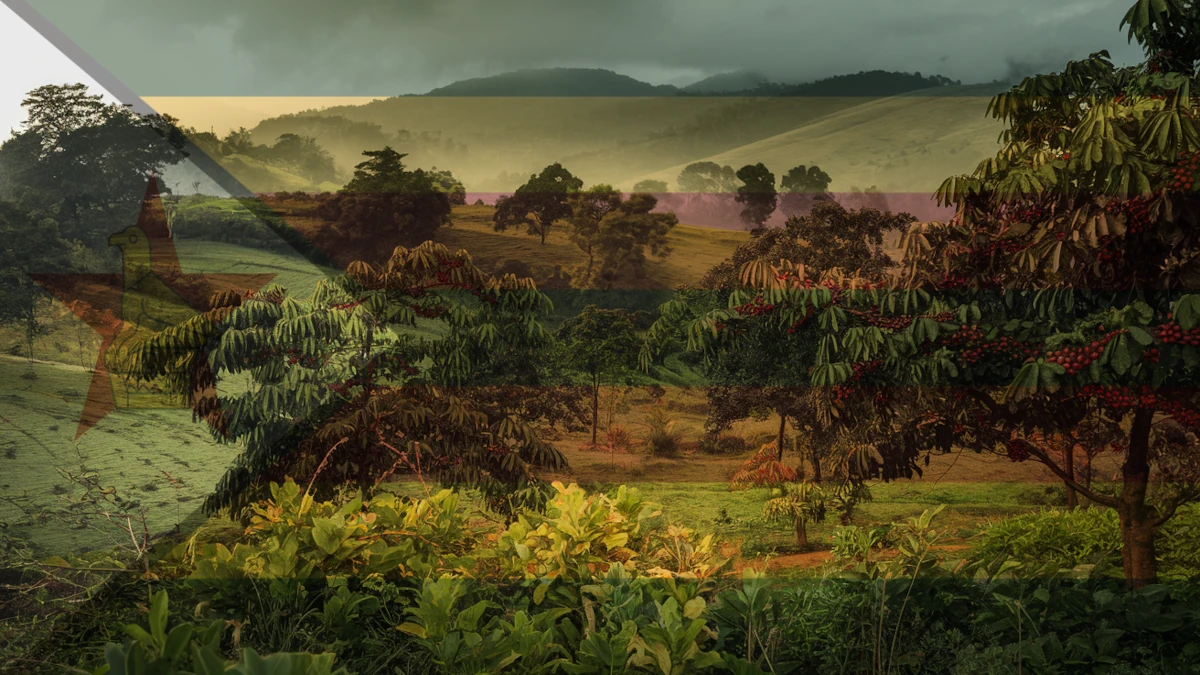Zimbabwe coffee beans are a hidden gem in the specialty coffee world, known for their bright acidity, complex flavors, and cultural significance. Hailing from the lush Eastern Highlands, regions like Chipinge, Mutare, and the Vumba Mountains offer a distinctive coffee experience shaped by unique terroir and history.
This article explores the fascinating story of Zimbabwean coffee, from its early cultivation and rise to global fame to the challenges it faced and its promising revival.
Table of Contents
The History of Zimbabwe Coffee
Early Beginnings
Coffee cultivation in Zimbabwe began in the late 19th century, introduced by British colonists. By the 1960s, commercial coffee farming flourished, making the country a recognized name in the global coffee trade.
Rise to Prominence
Zimbabwean coffee gained international acclaim during the 1980s for its wine-like sweetness and vibrant citrus notes. Export volumes soared as the beans were celebrated for their high quality.
Decline and Challenges
The 1990s marked a turning point. Political instability and land reforms devastated coffee production, with output dropping by 97% by the early 2000s. Many farmers abandoned coffee for more immediately profitable crops, threatening the industry’s survival.
Key Coffee-Growing Regions in Zimbabwe
Chipinge – Bright Acidity and Floral Notes
Located in the southern part of the Eastern Highlands, Chipinge boasts high altitudes, cool temperatures, and nutrient-rich soil. These factors contribute to Arabica beans with a bright acidity and floral, citrus flavors. The Catimor varietal thrives here, prized for its disease resistance and quick maturation.
Mutare – Balanced and Fruity Undertones
Mutare’s mountainous terrain and abundant rainfall create ideal conditions for coffee cultivation. Beans from this region offer a medium body, bright acidity, and fruity undertones, often drawing comparisons to Kenyan coffee.
Vumba Mountains – Earthy, Chocolatey Flavors
The volcanic soil and unique microclimate of the Vumba Mountains produce beans with complex flavor profiles, featuring earthy, chocolatey, and leathery notes. This region’s coffee offers a rich and well-rounded brew that appeals to enthusiasts.
The Revival of Zimbabwe Coffee
Steps Toward Recovery
In recent years, Zimbabwe has made significant strides to revive its coffee industry. Support from private investors, NGOs, and new government policies introduced in 2017 have revitalized small-scale farming and re-established the country’s coffee production on the global map.
Role of Small-Scale Farmers
The revival effort is led by small estates, focusing on high-quality beans rather than volume. Varietals like SL-28, SL-34, Catimor, and Caturra now dominate production, showcasing a diverse flavor spectrum.
Reclaiming Global Prominence
Zimbabwean coffee is once again attracting attention from specialty markets worldwide. With growing demand for premium beans, the industry is poised for a remarkable comeback.
What Makes Zimbabwean Coffee Unique?
Comparison with Other African Coffees
Zimbabwean coffee shares the bright acidity and fruity notes typical of African coffees like Kenya’s. However, its fuller body and distinctive earthy undertones set it apart, offering a unique sensory experience.
Unique Terroir of the Eastern Highlands
The Eastern Highlands’ volcanic soil, high altitude, and cool climate create ideal growing conditions. These factors contribute to Zimbabwean coffee’s signature earthy, chocolatey, and floral characteristics.
The Future of Zimbabwe Coffee
Opportunities for Growth
Zimbabwe’s re-emergence in the specialty coffee market presents numerous growth opportunities. Increased global demand for quality coffee can spur further investment and innovation in farming practices.
Challenges Ahead
The industry must address economic and political uncertainties while navigating the impact of climate change on coffee production. Sustained support for small-scale farmers will be crucial.
Vision for Zimbabwe Coffee
With a commitment to sustainability, innovation, and quality, Zimbabwean coffee is well-positioned to reclaim its place among the world’s finest.
Conclusion
Zimbabwe coffee beans represent a story of resilience, passion, and renewal. From the floral notes of Chipinge to the earthy richness of the Vumba Mountains, Zimbabwean coffee offers a unique and captivating flavor journey.
For coffee lovers and connoisseurs, now is the perfect time to explore the vibrant world of Zimbabwe coffee and support its promising future.
